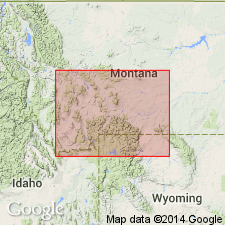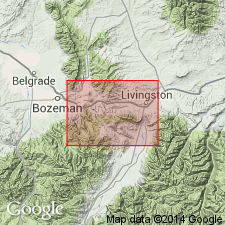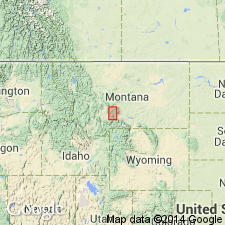
- Usage in publication:
-
- Billman Creek Formation*
- Modifications:
-
- Named
- Dominant lithology:
-
- Claystone
- Sandstone
- Siltstone
- Conglomerate
- AAPG geologic province:
-
- Montana folded belt
Summary:
Named as a formation of the Livingston Group (rank raised) for exposures near Billman Creek in S1/2 sec 13, T2S, R8E and W1/2 sec 18, T2S, R9E (also the type section), Park Co, MT, Montana folded belt province. Conformably overlies Miner Creek Formation (new) of Livingston Group and is conformably overlain by Hoppers Formation (new), upper formation of Livingston. Is 2,590 ft thick at type. Is mostly claystone but includes sandstone, siltstone, and conglomerate. Is less resistant to erosion than adjacent formations. Claystone (about 65% of the formation) is massive bedded, and grades from dusky red near base to gray brown in middle to olive black to olive gray in upper part. Channel sandstones and conglomerate make up about 25% of the formation; they are yellow green and made up of volcanic-rock fragments, plagioclase, augite, diopside, hornblende, magnetite, biotite, quartz, and orthoclase cemented by silica. Dinosaur bones of Lance age and fresh-water mollusks identified. Of Late Cretaceous, Maestrichtian age. Correlation chart.
Source: GNU records (USGS DDS-6; Denver GNULEX).

- Usage in publication:
-
- Billman Creek Formation*
- Modifications:
-
- Overview
- AAPG geologic province:
-
- Montana folded belt
Summary:
Pg. C6-C7, C48-C50, C89-C95, pls. 1, 2. Billman Creek Formation of Livingston Group. A nonmarine, characteristically grayish-red, valley-forming unit. Mapped between Livingston, Park County, Montana, and Bozeman, Gallatin County, Montana, notably along Billman Creek (type area). Consists of massive olive-gray to grayish-red claystone with interbedded fine- to coarse-grained andesitic sandstone. Described in detail from measured type section; thickness 2,590 feet. Conformably overlies Miner Creek Formation; conformably underlies Hopper Formation, both of Livingston Group. Fossiliferous; contains fresh-water mollusks, palynomorphs, and plant fragments (identified by R.H. Tschudy and D.W. Taylor, USGS), and dinosaur bones. Mudstone at base of upper third of formation yielded a distinct palynomorph assemblage equivalent to type Colgate Member of Fox Hills Sandstone; siltstone near top of formation yielded plant fragments and a poor palynomorph assemblage, suggesting brackish-water deposition. Dinosaur bones of Maestrichtian age (Lancian) reported from localities in upper part of formation (citing McMannis, 1955, GSA Bull., v. 66, no. 11, p. 1408). Age is Late Cretaceous (Maestrichtian); is approximately same age as middle part of Hell Creek Formation. Report includes geologic map, correlation chart.
Source: Publication.

- Usage in publication:
-
- Billman Creek Formation*
- Modifications:
-
- Revised
- AAPG geologic province:
-
- Montana folded belt
Summary:
Can be mapped as a formation of Livingston Group throughout the study area within the Montana folded belt province. Considered to be early Maestrichtian in age. Overlies Sedan Formation, a newly named unit in the lower part of Livingston that is assigned a late Santonian and Campanian age.
Source: GNU records (USGS DDS-6; Denver GNULEX).
For more information, please contact Nancy Stamm, Geologic Names Committee Secretary.
Asterisk (*) indicates published by U.S. Geological Survey authors.
"No current usage" (†) implies that a name has been abandoned or has fallen into disuse. Former usage and, if known, replacement name given in parentheses ( ).
Slash (/) indicates name conflicts with nomenclatural guidelines (CSN, 1933; ACSN, 1961, 1970; NACSN, 1983, 2005, 2021). May be explained within brackets ([ ]).

